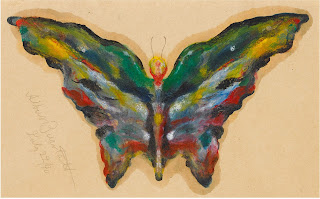Albert Bierstadt (1830-1902), was a German-born American painter famed for his sweeping depictions of the American landscape as part of the Hudson River School. These rugged, romanticised works focused heavily on mountains and rock formations, often illuminated by dramatic natural lighting. They captured the imagination of the American public, driving prices for his works to record heights and making Bierstadt one of the most accomplished and sought after painters of the second half of the nineteenth century.
Albert Bierstadt - 1830-190
Although a "serious" painter, Bierstadt also had his fun side which came out when he hosted gatherings and would produce autographed butterfly paintings as a party trick as souvenirs for children and women guests who attended these gatherings. About 24 of these charming little butterfly paintings survive, one even found its way into the fine and decorative art collection of the White House. Bierstadt was a house guest of President Rutherford B. Hayes for a week and he charmed the president's family by painting a couple of his butterflies. In 1892, a reporter attending an event hosted by Bierstadt recounted the artist’s process for creating such works—of which she was a happy recipient: “We women were so glad we were women that afternoon, for Mr. Bierstadt presented each lady with a souvenir. This is how he made them. We all clustered about the table and he took out a palette, a knife and some large slips of cartridge paper. Two or three daubs of pigment on the paper, a quick fold, and holding it still folded against a pane of glass, he made two or three strokes of that wizard-like palette knife on the outside, and hey, presto! a wonderful Brazilian butterfly or moth, even the veining on the wings complete! A pencil touch added the antennae, the artist’s autograph was added to the corner, and now we each of us own a painting by Bierstadt.”





.jpg)



























No comments:
Post a Comment